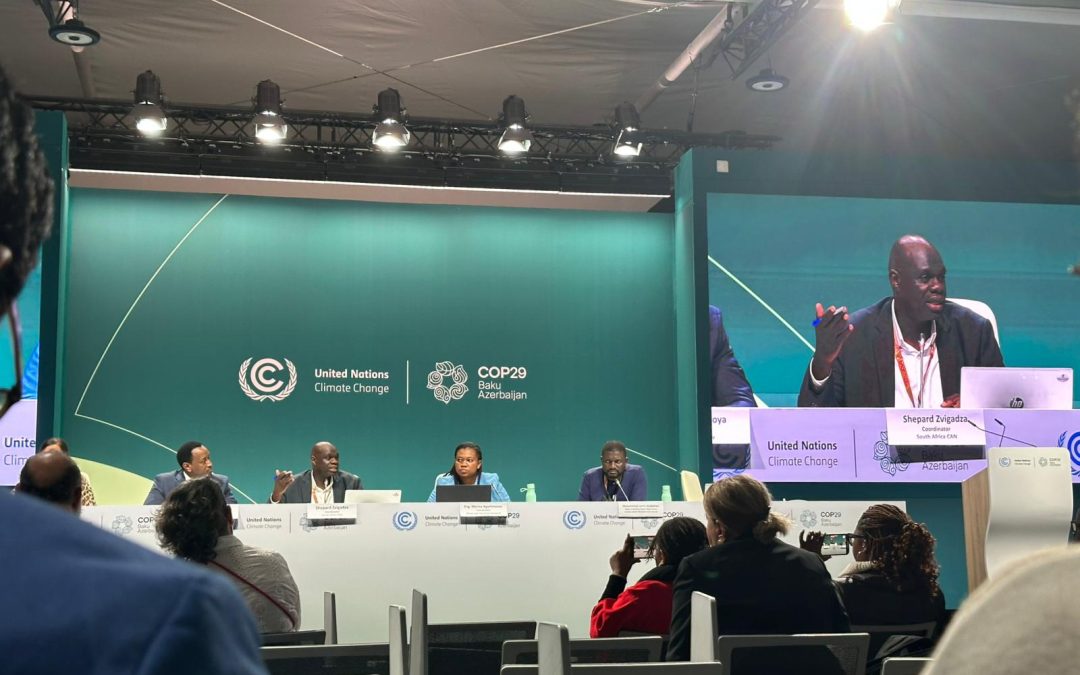Written by Mahilet Berihun, PhD student with SCENARIO DTP, University of Surrey
When Jiwoh Emmanuel Abdulai, Minister of Environment and Climate Change for Sierra Leone, opened the COP29 session on Delivering for Africa, he set the scene by exploring how most Global South countries have already been paying for the cost of climate change. Hearing a number as big as $1.3 trillion, the recently proposed NCQG figure, may appear unrealistic to many. However, African ministers are trying to draw the world’s attention to the fact that African governments have already been paying, out of their commitments to the people, a great deal of money to respond to climate change and meet NDCs. The WMO estimated African countries are spending 2%-5% of their GDP’s, with many countries spending up to 9% responding to climate hazards [1] These numbers do not include the social consequences of climate change whose impacts are difficult to quantify into a neat figure: displacement, food and water insecurity resulting health problems, and so much more. Africa has long been paying for climate action from its own resources whilst balancing this out with the much-needed development in infrastructure and energy. In the words of Abdulai, climate change is “bleeding Africa dry”.
According the 2024 UNFCC report of the Standing Committee on Finance, the estimated cost of implementing NDCs for 98 developing countries, many of which are in Africa, is close to $6 trillion [2]. For climate finance to work, the Global North needs to feel the same sense of urgency and commitment as the governments of countries most impacted by climate change. This makes the figure of $1.3 trillion realistic and achievable because there is evidence that a higher price is already being paid in Africa and much of the global south. It is only through genuine will to better the conditions of people around the world that COP29 deliver for African countries, for whom the stakes are extremely high. Therefore, whatever reaction we may have to the large numbers the global south is asking from the global north, we must understand the context from which they arise.
Africa is not solely focusing on the final figure. Ministers are encouraging us to look back at commitments from previous years, primarily the annual $100billion formalised as the NCQG at COP16, and ensure lessons are learnt forward for future implementation. The Minister of Environment, Climate Change and Natural Resources of the Gambia, Rohey John Majang, highlighted the fact that a significant portion of the commitments promised to the global south have reached them in forms of loans. Even in the year 2022, which was championed by many for reaching the $100billion goal, Oxfam estimates around 70% of the public finance was given to the Global South in the form of loans [3]. This has been a topic of conversation on many Africa-centred panels. At the Climate Action Network (CAN) press conference, EED Advisor Dr Tedd Moya criticised this unfair practice by highlighting how these loans create what he calls an ‘intergenerational equity problem’, where future African generations inherit loan repayments related to climate change when they aren’t inheriting the fossil fuel driven development found in much of the Global North. The parallels here are striking; whilst the Global North expresses fear for what kind of world it is leaving for future generations, not only is it failing to include African generations in this thought, but the implementation of the solutions proposed can also negatively impact the future of Africa.
There needs to be a change in the modes of implementation in the new figure, learning from past mistakes and centring African (and wider Global South) voices. Co-ordinator of the Just Transition Network, Marina Agortimevor, highlighted the difficulty in accessing grants, especially for grassroots communities. This point has been echoed by other activists from Latin America in the discussion around the Atacama Desert in Chile. There needs to be effort from all Parties in ensuring a more efficient and culturally sensitive use of climate funds.
“We cannot live under conditions where each and every day, we wake up to a crisis which wipes out a whole community or even a whole country for a crime which we never committed” Rohey John Majang says, drawing attention to the reality of many African countries. Africa demands justice and is taking a firm stand in accepting nothing short of it.
References
[1] World Meteorological Organisation, 2024. State of the Climate in Africa 2023. Available at: https://wmo.int/publication-series/state-of-climate-africa-2023#:~:text=On%20average%2C%20African%20countries%20are,the%20region’s%20Gross%20Domestic%20Product.
[2] UNFCC, 2021. Executive summary by the Standing Committee on Finance of the first report on the determination of the needs of developing country Parties related to implementing the Convention and the Paris Agreement. Available at: https://unfccc.int/sites/default/files/resource/54307_2%20-%20UNFCCC%20First%20NDR%20summary%20-%20V6.pdf
[3] Oxfam, 2024. ‘Rich countries overstating “true value” of climate finance by up to $88 billion, says Oxfam’ Available at : https://unfccc.int/sites/default/files/resource/54307_2%20-%20UNFCCC%20First%20NDR%20summary%20-%20V6.pdf


